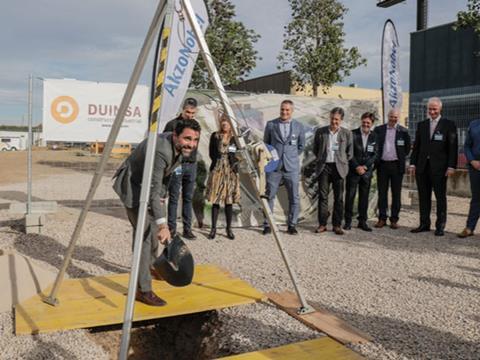
Paints and coatings company AkzoNobel is investing €32 million into a new plant at Vilafranca del Penedès to manufacture bisphenol-free coatings for metal packaging companies in the EMEA region.
Scheduled to begin operations by mid-2025, the new facility is set to create around 40 new jobs and fulfil a ‘strong need’ from the packaging industry. It has also been designed for eco-efficiency, hoping to meet the ‘best possible’ standards.
Jim Kavanagh, director of the company’s Industrial Coatings business, explains: “The Vilafranca plant will allow us to offer leading-edge products to any customer and country in EMEA, responding to the most stringent bisphenol regulations in force in Europe. The investment is in line with our view that bisphenols of any kind are no longer required to create safe coatings.”
The investment comes after AkzoNobel launched its first BPA-NI, or Bisphenol A non-intent, internal coating for beverage can ends in May. Because of their classification, they comply with both EU and FDA regulations for contact-sensitive packaging.
This has since been followed by the release of two external coatings as the first instalments for AkzoNobel’s Accelstyle range. These products are designed for conventional two-piece aluminium beer and beverage cans and are reportedly free from bisphenol, styrene, and PFAS.
Kavanagh continues: “Both new products – Accelstyle 100 and 200 – can be seamlessly introduced into existing production processes, allowing can makers to transition to coatings that are free from materials of concern, while remaining as commercially viable as possible.
“The new technology we’ve developed can also reduce carbon footprint by around 30% compared with current epoxy alternatives, highlighting the fact that bisphenol-free metal packaging isn’t just circular, it also meets consumer expectations for sustainable packaging.”
AkzoNobel underlines its commitment to both consumer safety and sustainability in its material substitutions. It also aims to keep value chain disruption at a minimum, working alongside customers to transition into bisphenol alternatives as quickly as possible.
At AEROBAL’s World Aluminium Aerosol Can Awards 2023, Nussbaum and Salchi Metalcoat’s ‘smart sustainable aerosol can’ took home a prize under the ‘prototype’ category. Its inner coating is made of a non-BPA epoxy gold lacquer.
PPG’s acrylic internal spray coating for aluminium beverage cans was unveiled in the summer of 2022 and also claims to be free of BPA or bisphenol starting substances.
Lorena Pla Muñoz, Chromatography Laboratory researcher at AIMPLAS, recently discussed EU legislation and BPA in food and beverage packaging – raising the point that recycling process and raw materials from recycled plastics can become a source of BPA and calling for thorough testing processes to prevent unintentional contamination.
If you liked this article, you might also enjoy:
The L’Oréal approach to packaging sustainability
The way we talk about plastic needs to change – here’s how to get it right
What steps is Apple taking to make its packaging more sustainable?














No comments yet